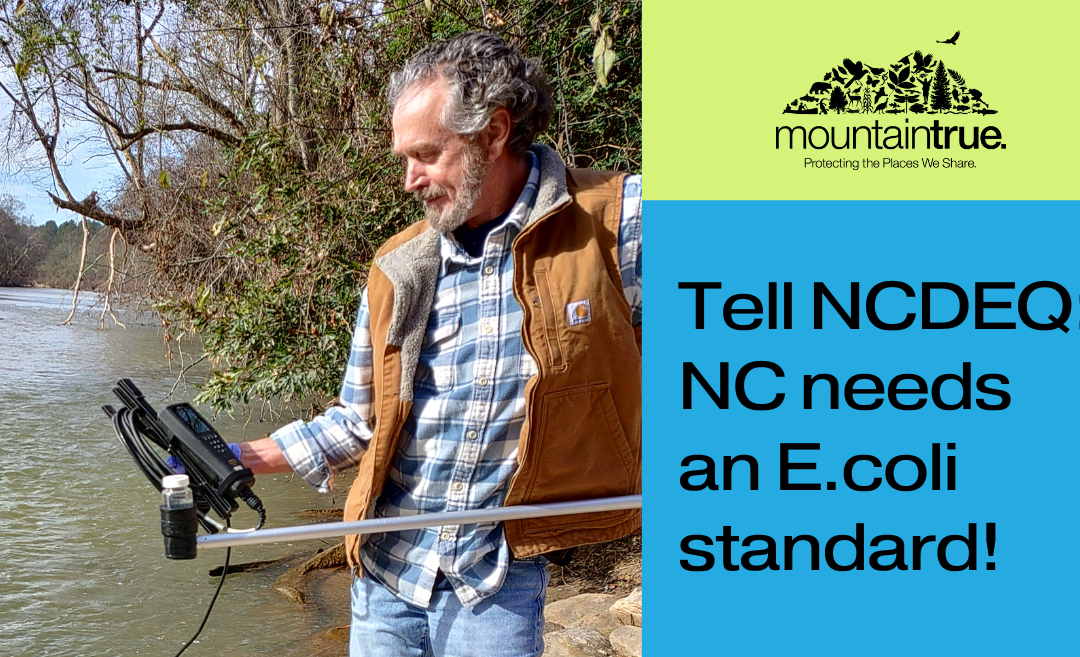

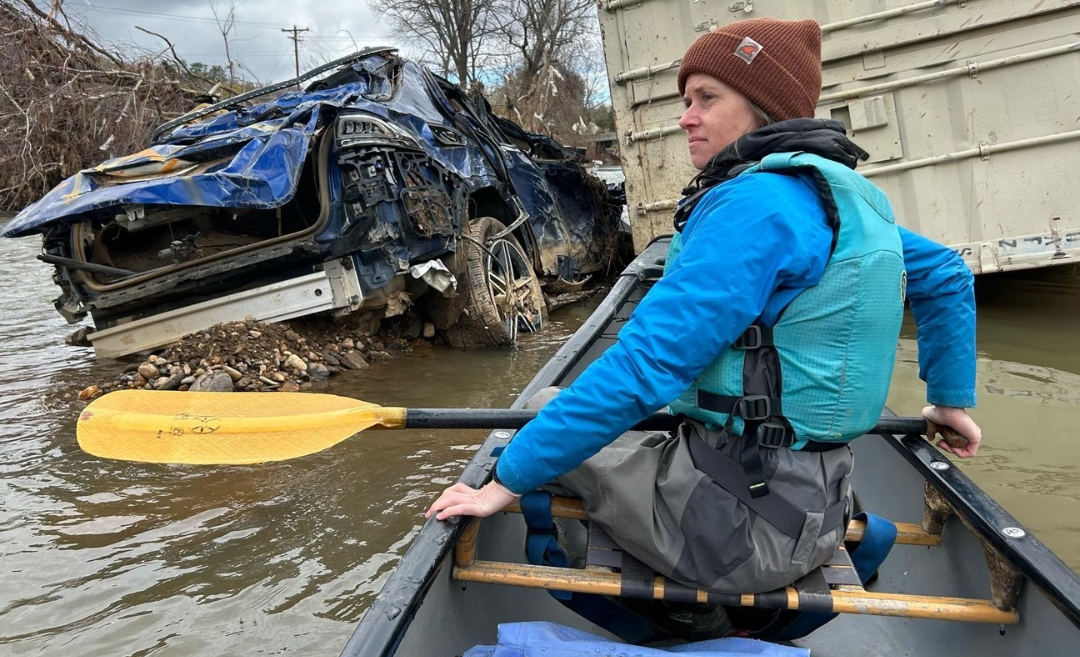
Press Release: MountainTrue Announces Anna Alsobrook as New French Broad Riverkeeper
Press Release: MountainTrue Announces Anna Alsobrook as New French Broad Riverkeeper
Photo: Anna Alsobrook paddles the French Broad River to assess the damage in Asheville’s River Arts District after Hurricane Helene, photo by Hartwell Carson.
March 2025
FOR IMMEDIATE RELEASE
MountainTrue Announces Anna Alsobrook as New French Broad Riverkeeper
Asheville, NC – MountainTrue welcomed Anna Alsobrook as the organization’s new French Broad Riverkeeper in early March. Anna has been part of the MountainTrue team since 2014, most recently serving as their Watershed Science & Policy Manager.
“My love of the French Broad started with a canoe-camping trip down section 10 of the river with a NC Outward Bound trip. I’d never done or seen anything quite like that before. I got to experience the sacredness of this river and these mountains. It has truly been an honor to work for its protection, and I’m thrilled to step into the French Broad Riverkeeper role,” said Alsobrook. “I’ve had the privilege of working alongside Hartwell Carson [previous French Broad Riverkeeper] for the last 10 years, and there’s not a week that goes by that I don’t learn something from him. I’m so grateful for his mentorship and guidance. The French Broad is lucky to have had his voice for the last 20 years.”
Hartwell Carson now serves as MountainTrue’s Clean Waters Program Director and works directly with all four of MountainTrue’s Riverkeepers — the Broad, French Broad, Green, and Watauga Riverkeepers — to protect waterways across the Southern Blue Ridge.
“I thoroughly enjoyed being the eyes and ears for the river during my time as French Broad Riverkeeper,” said Carson. “Our work put the French Broad on the map as a great place to recreate by establishing the French Broad Paddle Trail; vastly increasing awareness of the threats posed to the river by pollution; establishing a monitoring program that is one of the first of its kind in the world; forcing Duke Energy to clean up their coal ash ponds and close their power plant; restoring miles of streams; and hosting a plethora of volunteers to help clean up millions of pounds of trash in the river and along its banks.”
Stay up-to-date with Anna’s work as the French Broad Riverkeeper on Instagram and Facebook; she can also be reached via email at anna@mountaintrue.org. Hartwell can still be reached hartwell@mountaintrue.org.
About MountainTrue
MountainTrue champions resilient forests, clean waters, and healthy communities. We are committed to keeping our mountain region a beautiful place to live, work, and play. Our members protect our forests, clean up our rivers, plan vibrant and livable communities, and advocate for a sound and sustainable future for all. MountainTrue is active in the Broad, French Broad, Green, Hiwassee, Little Tennessee, New, and Watauga watersheds and is home to the Broad Riverkeeper, French Broad Riverkeeper, Green Riverkeeper, and Watauga Riverkeeper.
In the aftermath of Hurricane Helene, MountainTrue is committed to leading the recovery of our region with a vision to rebuild stronger, safer, and better prepared for the impacts of climate change. mountaintrue.org
###
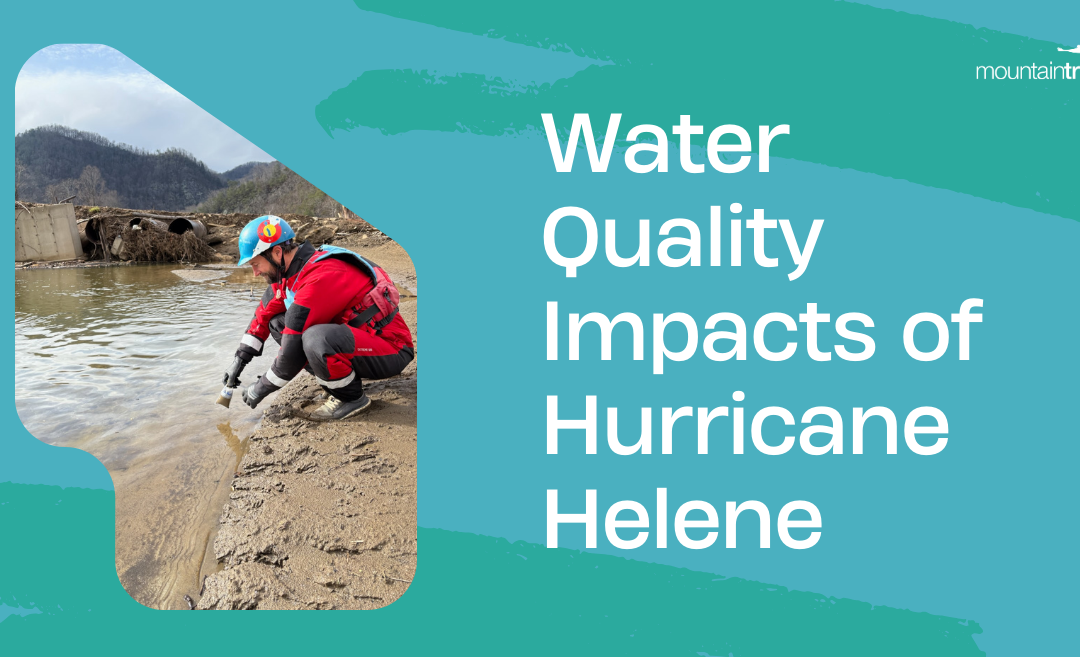
Report: Water Quality Impacts of Helene
Report: Water Quality Impacts of Helene
Our Clean Waters team compiled a report summarizing MountainTrue’s sampling efforts post-Hurricane Helene. Click the button below to download/read the report.
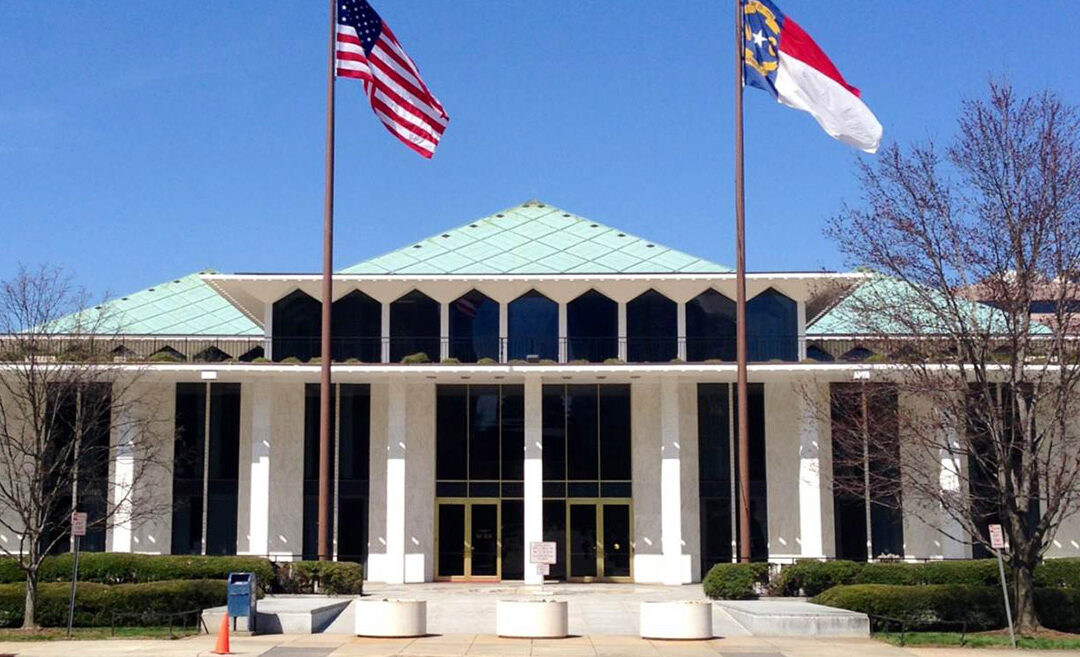
MT Raleigh Report – HB47 is A Critical $500M Lifeline for Western NC Recovery
MT Raleigh Report – HB47 is A Critical $500M Lifeline for Western NC Recovery
If you’re surprised to learn that the North Carolina General Assembly has been in session since January, you’re not alone. Despite the urgent needs of Western NC following Hurricane Helene, the legislature has yet to approve a relief package so far this year.
That may soon change. This week, the state House is expected to approve HB47, a $500 million relief bill. While that’s a step in the right direction, the bill still faces uncertainty in the Senate, and it remains unclear when and at what amount the General Assembly will use its billions in unspent reserves for disaster aid.
What’s in HB47?
HB47 would allocate state funds for housing, environmental restoration, debris removal, small business grants, and other critical recovery efforts. MountainTrue supports this bill, particularly the funding for debris removal and restoration projects. You can find a plain-English summary of the latest version of the bill here.
What’s Next?
If the bill passes the House as expected, it will still need approval from the Senate, which has shown less urgency on disaster relief. Senate leaders tend to be more cautious about spending and want to wait for federal agencies like FEMA to complete their recovery work before committing state funds. This could delay progress or result in a reduced package.
MountainTrue has already reached out to Senate leaders to advocate for quick approval of HB47 as written. Our staff will be in Raleigh this week to meet with lawmakers across both parties to stress the importance of timely disaster assistance and share our priorities for the 2025 legislative session.
You can read our full 2025 legislative agenda here.
Looking Ahead
HB47 is just the beginning. House leaders have indicated that it will be the first of several disaster relief bills for Western NC. However, differences between the House and Senate are likely to continue, particularly regarding the amount and structure of disaster funding. The Senate’s preference may be to address this through the broader 2025-2027 state budget process, which typically takes months to finalize.
Governor Josh Stein expressed support for the House’s disaster recovery bill as a good start while calling for even larger investments in recovery. He also urged the federal government to provide an additional $19 billion in disaster aid.
Why Your Support Matters
The General Assembly’s action – or inaction – on Helene recovery underscores the importance of having a strong voice for Western NC in Raleigh. That’s why MountainTrue is proud to be the only WNC environmental organization with a year-round lobbyist in the state capital. Your support makes that possible, and we are deeply grateful.
Thank you for standing with us as we continue advocating for a strong, swift recovery for our region.
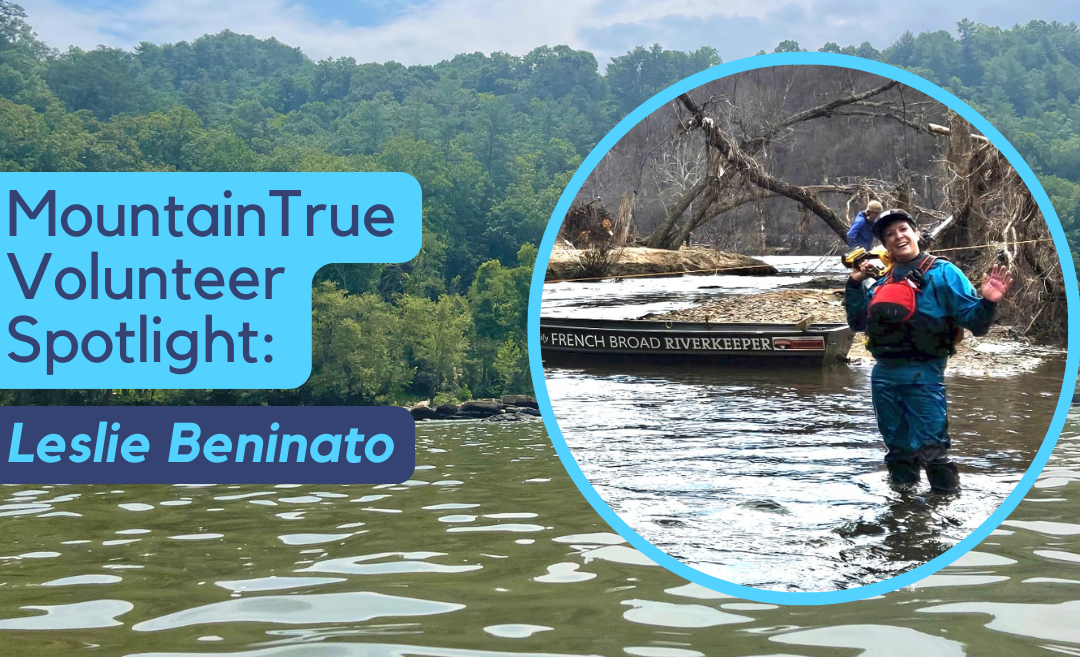
MountainTrue Volunteer Spotlight: Leslie Beninato
MountainTrue Volunteer Spotlight: Leslie Beninato
Tell us a bit about yourself.
My name is Leslie Beninato, and I’m the owner of Asheville Canoe House, a canoe rental company. Before Helene, I was also a raft guide, bike guide, and bike tech for a local outdoor company. I’ve lived in WNC for almost 20 years and have resided in Asheville for 11 years. I went to Appalachian State University and decided I never wanted to leave the mountains.
What do you love about where you live?
Well, I love the French Broad River for multiple reasons, the history and the wildlife being a few, even before I started my business. I think the coolest fact that surprises folks is how old the French Broad actually is (it formed between 260 and 325 million years ago before the continents split apart).
What’s your go-to river activity?
I love paddling in all forms. Usually, you can find me canoeing, rafting, or whitewater stand-up paddleboarding. Treasure hunting/river cleanups are a nice bonus when on the water.
What’s your connection to MountainTrue?
I have been volunteering with MountainTrue and other local nonprofits since moving to Asheville over 10 years ago. I’ve also been organizing cleanups on my own post-Helene.
I support MountainTrue by assisting in cleanup efforts, assisting with volunteer organization, keeping the work areas safe for volunteers, and scouting out potential river hazards and new features that may be created after storms. Promoting safe and healthy use of our local rivers and streams while educating the public and tourists has always been a top personal priority. So, helping with cleanup efforts before and after Helene was just something natural.
Why do you think folks should get involved with/support our work?
All nonprofits can use support and help (monetarily or physically); I help physically when
hands are needed and I speak for the river when she needs a helping voice. Anything helps. Whether you donate $5 or $500, whether you pick up one piece of trash or thousands. No big skill level is needed nor is age a factor when volunteering. For example, if I’m feeling low energy or overwhelmed (especially since Helene), I always feel better after getting outside and getting my hands dirty; seeing others also out there really inspires you to do/be better. So if you don’t volunteer just to help your community, you can at least volunteer to help yourself.
Anything else you’d like to share?
The community and the river will need help for years to come. Please continue to donate
in whatever way you can to the local nonprofits helping our community members in need and to our environmental nonprofits to help keep Appalachia a beautiful and sacred place.
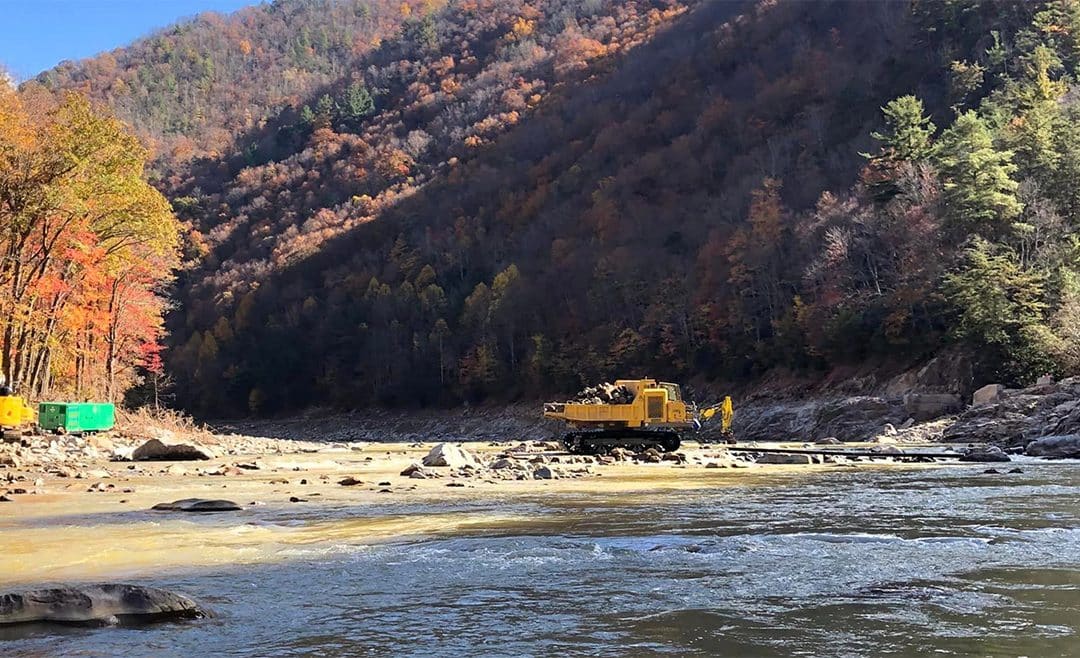
Protect the Nolichucky River! Tell NC DEQ: Require Stronger Environmental Protections for CSX’s Railroad Rebuild
Protect the Nolichucky River! Tell NC DEQ: Require Stronger Environmental Protections for CSX’s Railroad Rebuild
Photo courtesy of Jubal Roe.
Keep advocating to protect the Nolichucky! Please comment now to ensure stronger environmental requirements for CSX as they rebuild their railroad through North Carolina’s Nolichucky River Gorge.
North Carolina’s Department of Environmental Quality is requesting public comment on CSX’s application to rebuild their railroad through our state’s section of the Nolichucky River Gorge. You may recall that CSX’s railroad experienced extensive damage as a result of Hurricane Helene, and CSX immediately started rebuilding in a manner that was highly damaging to the Nolichucky River’s Wild and Scenic values. Your advocacy helped stop their destruction previously but unfortunately, CSX is back at it under new approvals from the Army Corps of Engineers.
The North Carolina Department of Environmental Quality can stop CSX’s most harmful practices and we need your help again pushing for strong environmental protections in their permit. Please use the link below to submit comments and help us protect the Nolichucky. We encourage you to make your comment your own, but the following may serve as a framework:
https://edocs.deq.nc.gov/Forms/401_Public_Notice_Comments
ID#: 20241562
Version: 2
Project Name: CSXT Emergency Track Rebuild Post Hurricane Helene
Your stance on the project: No
Comment:
I am opposed to this project without additional protections. The following provisions, if included, would allow me to support this project:
- DEQ should prohibit any harvesting, mining, or excavation of material from below the ordinary high-water mark. Tennessee’s Department of Environment and Conservation has already prohibited the removal of material below the ordinary high-water mark in Tennessee. NC DEQ should do the same.
- DEQ should establish an ordinary high-water mark using the Army Corps’ January 2025 Ordinary High-Water Mark Manual. That analysis indicates the ordinary high-water mark should be approximately 6 feet above baseflow in the Gorge.
- DEQ must prohibit the removal of rock or any other material from any named rapid.
- DEQ should require CSX to provide for safe recreational and commercial whitewater access during reconstruction.
- The Nolichucky Gorge has been designated by the U.S. Fish and Wildlife Service as critical habitat for the endangered Appalachian Elktoe. It is also habitat for the Eastern Hellbender, which the Fish and Wildlife Service recently proposed for listing under the Endangered Species Act. DEQ should require CSX to survey areas for Appalachian Elktoe and Eastern Hellbender presence before CSX takes any action – including operating machinery such as dump trucks and excavators – below the ordinary high-water mark.
